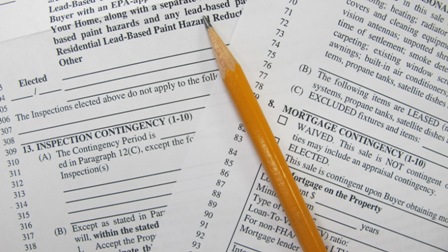con·tin·gen·cy
– dependence on chance or on the fulfillment of a condition; uncertainty; fortuitousness: Nothing was left to contingency.
A contingent offer is pretty standard in real estate. It means an offer on a home has been made and the seller has accepted it, but the finalized sale is contingent upon certain criteria that have to be met. These criteria, or contingencies, typically consist of 5 varieties: home inspection, appraisal, mortgage, home sale, and sale and settlement contingencies.
These contingencies are mainly put in place for the buyer to back out of a sale if a specific event does not occur or if something unexpected does occur, usually without losing their deposit. A seller might entertain other offers, but will not deal with another buyer until the contingent offer is finished in one way or another. Think of a contingency as a legal method to cancel a contract without penalty.
Home Inspection Contingency
A home inspection contingency could well be the most important one. It gives the buyer the right to have the home professionally inspected by a certified ASHI (American Society Of Home Inspectors) inspector, not their brother in law contractor or their Uncle who works in construction. If there are deficiencies in the house the buyer can request it be fixed or they can back out of the sale, and have their deposit money returned. It is rarely advisable to waive an inspection contingency. The waiving of the inspection contingency is most often used to better position an offer in a multiple offer situation, but it should be used with extreme caution, if at all in my opinion.
Appraisal Contingency
With this contingency, a third party hired by the lender evaluates the fair-market value of the home. In the instance the appraised value is less than the sale price, the appraisal contingency lets you back out of the deal.
In hot markets, eager buyers might feel pressured to waive it in order to make their contract more attractive to the seller. However, the lender will only put up a certain amount of money for the appraised cost—not the asking price—and the buyer will have to cover the rest.
For example, let’s say you have mortgage that is financing 90% of the purchase price and you need to put 10% down for a home selling for $500,000. If the house is appraised at $475,000, the lender is only going to cover 90 percent of that appraised value, or $427,500. And instead of a $50,000 down payment, the buyer would be expected to put down $72,500 to cover the difference. Waiving this contingency can be a gamble.
Mortgage Contingency
You don’t want to sign a property sale without having the money to back it up. A mortgage contingency protects the buyer and seller from getting into a sale without a proper loan. Under this contingency, the buyer has a specified time period to obtain a loan that will cover the mortgage. If the buyer can’t get a lender to commit to a loan, the buyer has the right to walk away from the sale with the down payment.
Like an appraisal contingency, eager buyers and sellers in hot markets might want to waive this contingency, especially if cash is on the table. But waiving this contingency means that if your lender delays or denies your loan, you can lose the deposit, so it’s a risky venture.
Sale And Settlement Contingency
A sale and settlement contingency is a condition in which a buyer writes a purchase offer for a home and attaches the requirement that their current home must sell and settle prior to the settlement of the new home. The contingency specifies that the buyer has X number of days in order to sell a current home, typically 60 days. During that time the seller can continue to market their home and accept offers. If an offer is received that has is better than the original offer the seller can request the original buyer remove their contingency within a specified period of time, usually 24 – 48 hours. If the prospective buyer is unable to proceed without the contingency the contract is voided and any deposit monies are returned. When the buyer’s home goes under contract a settlement contingency goes into effect.
Settlement Contingency
This is a common contingency in which the contract is predicated upon the buyer’s current home going to settlement prior to the purchase of the new home. Typically the buyer needs the proceeds from the sale of the original property in order to fund the purchase of the new home. If the original property does not settle on specified date the contract can be terminated and any deposit monies on hand are returned.
Wallingford PA Real Estate – Wallingford, PA 19086


